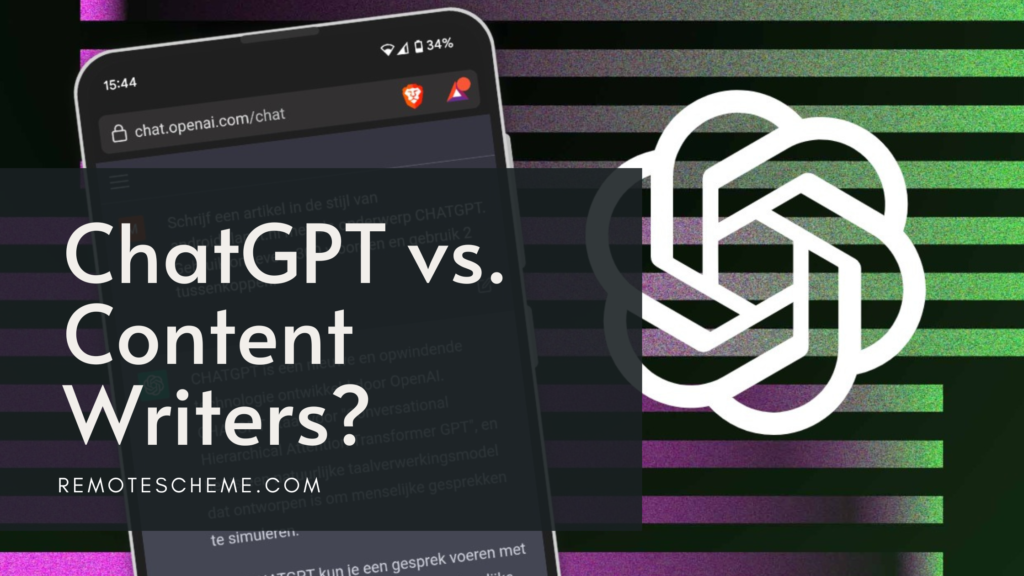Professional writing is one of those jobs that have been around in some capacity since ancient times when quills, charcoal, and even stone chisels were the tools of the trade. It’s also one of the reasons that society has gotten as far as it has.
Could you imagine where we would all be if history wasn’t recorded and preserved for us all to learn from, or if the ideas and concepts of our forefathers weren’t written down for the next great mind to pick up and expand upon decades later?
Our greatest advantages in life would never have existed without that time-transcendent communication.
However, it appears that the age-old task of a writer is quickly going the way of the dodo. With our latest technological advances, AI can supposedly write everything we can in an instant, and all anyone has to do to access such incredible power is pay a monthly fee.
So, is it true? Are writers doomed to go extinct in the next few years, only to be replaced by a robotic mind operating faster than anything we could have imagined?
Well, yes. The writing industry is doomed. At least, that’s the case if we don’t take action today and remind people what we’re made of.
There is hope, but writers can’t just sit back and go with the flow, anymore. Let’s talk about it.
What Is AI?
AI is all over the headlines, nowadays.
Every random company is trying to leverage it in one way or another, and there’s is a massive storm forming in the art community thanks to AI-generated art allowing any random person to type a few keywords in and become the next Van Gogh.
However, it’s not exactly what you think.
The AI being marketed is not something ripped out of a Terminator movie. It’s not a conscious entity capable of making real human decisions with all the factors and reasoning that humans put into their choices. At least, it’s not like that, yet.
For now, AI is more of a compilation tool. It automatically takes in ridiculous amounts of data, stores it, and then picks at it whenever it’s given a task that’s relevant to something it possesses.
For instance, if you ask an AI when the Declaration of Independence was signed and the US became a country, you’d get a response similar to “The Declaration of Independence was signed in 1776.”
If you then asked the AI how it knows that, it would list off a bunch of resources you could have easily accessed yourself, and you can even ask it to find another source.
It’s a lot like a very complicated directory that happens to have a decent grasp of the English language built in.
Why People Are Turning To AI For Content Writing
AI is affecting all the arts. People are recklessly generating AI paintings, music, books, and more as they wrap their heads around their shiny new toy, but there’s a unique reason for its usage in the writing industry, and it goes back to content mills.
Don’t worry. We’ll explain the correlation.
In the early 00s, it wasn’t uncommon for a writer to make as much as 30 cents per word. Consider the fact that the average long-form article is 2000 words and can be written fairly quickly by a talented writer, and it adds up.
Around the early 00s, content mills started forming as the internet became more developed. By the 2010s, they were prolific and became a staple of the modern business world.
Companies could go to a content mill and pay as little as 2 cents per word. That’s a pretty big discount, huh? Even better, the mills would promise ridiculous turn-around rates such as 1-day deadlines for 4000-word pieces.
Of course, budding writers took to those platforms and thought they were getting a good deal. They were getting ripped off. However, while the early freelance writers would come to acknowledge their mistakes, the industry would be changed forever.
That high average price for a decent writer quickly dropped. Customers became accustomed to those prices, and to stay competitive, writers had to keep selling themselves short. This led to the value of modern writers dropping considerably.
However, that has balanced out in recent years.
No, the average content writer isn’t making as much as their predecessors unless they work for an exceptional content-production company or develop a solid business model, but it’s very possible for a simple freelancer to not only make a good living but to completely change their life for the better, too.
So, how does that reconnect to the AI topic at hand? Well, it comes down to not valuing writers.
Many companies were conditioned to seek out the lowest prices with the fastest deadlines regardless of whether or not the writer was being compensated fairly. In many cases, writers would make well below minimum wage, and the less business-savvy ones still do.
AI is the next step in that unfortunate process.
Why pay a writer $200 to spend three days creating one long list of marketing emails for your campaign if you can pay the same $200 for a subscription that almost instantly generates that and can crank out the rest of your month’s workload almost instantly?
Oh, don’t you worry. We’ll get to that.
AI is the evolution of the content mills of yesterday. Except, the AI doesn’t need sleep, wages, or meaningful communication.
The Problems With AI
Right now, everyone is viewing AI like a shiny new toy. They can’t get enough of it. However, it’s not perfect, and those who aren’t familiar with the creative fields they’re helping to destroy won’t immediately pick up on those problems.
So, we’ll lay them out for you. If you’re a writer, you’ll know your opposition’s weak spots. If you’re a person leveraging AI, these are the things you’re likely not considering.
#1. No Ability To Think On-the-Spot
Writing, especially in a language as nonsensical as English, is not cut and dry.
The same word can mean completely different things depending on the context.
Some words might be culturally used to insinuate something that isn’t relevant to the actual definition, and there are just tons of things that require you to understand the words outside of whatever Merriam-Webster babbles on about in the dictionary.
For example, the word heater can mean a furnace or a firearm depending on the context. The AI doesn’t know that.
If you ask the AI to write an urban short story with a focus on “heaters” and gang violence, you’re going to get a very odd tale about gangbangers infatuated with furnaces.
For creative pieces that aren’t written by-the-book, AI is going to fail.
#2. No Emotion Or Ability To Infer
Emotion is a key part of writing. If you’re writing a novel, your goal is to absorb the reader into a world of your own creation that elicits real feelings from them. It’s how people end up crying over fictional characters or become obsessed with fantastical worlds.
Even with marketing, emotion is a key focus.
There’s a reason most marketing pieces open with “pain points”. These are the problems people are facing that a product can solve, and as a marketer, it’s your job to actively manipulate those emotions so they buy the product.
AI doesn’t have emotions, and it doesn’t understand them. The surest way to understand this is to read a poem written by a literary great such as Sylvia Plathe, and then ask a fancy AI program to write something similar.
You won’t get the same feelings from the AI poem, because it was written by a soulless husk.
In this very piece, you can probably tell that we’re a little hostile. It comes off in our tone. An AI would just regurgitate facts.
Another part of this is sarcasm. It’s a useful tool, and it can be hilarious. AI doesn’t use sarcasm, and if it takes over the industry, it’s going to be awfully dull.
#3. No Human Element
In today’s age, we have self-checkout, one-click online ordering, automated cars, and even the pizza guy will leave your pizza on your porch if you don’t want to answer the door.
It’s not healthy. In fact, it leads to depression, anti-social behavior, and an insufferable level of entitlement and brat-like behavior when we actually have to talk to people.
With a human writer, you sit down, you talk about your project, your goals, and your expectations. You also have to consider that another person is on the other side of the screen. You feel the social need to care about that other person and how you treat them.
This is a normal part of being human, and in a world that is becoming increasingly lonely, the industry and its customers need to understand the value of that social interaction.
What Can Be Done About AI?
AI isn’t all bad. It can definitely have some positive applications. For example, someone with no experience who is looking to hire a writer might use AI to generate a rough outline of their ideas, and that will give the writer a better idea of what they need.
AI can also be used for more clear-cut pieces such as instruction manuals that don’t need to have a human’s touch to be effective.
However, the current path AI is on is not a good one. Even worse, it’s being embraced in mass. We’ve all probably lost long-time customers to a dumb chatbot over the last few months, but there are some things that can be done.
#1. Take A Stand
This is your industry. Don’t help or train your replacement.
If you’ve been writing for a few years, you probably noticed the earlier AI programs.
There was a trend where customers would use a low-quality AI that could barely write coherent sentences to generate content, and then they’d offer “editing” jobs to writers to touch the work up. Of course, they would pay ridiculously low wages for the task.
Many writers turned those clients down and considered it an insult. Today, it’s up to us to do the same. If you don’t want to be replaced, don’t support the practice. You might lose a few customers now, but that’s better than losing them all later on.
#2. Show The Industry Your Grit
People who win fights don’t do it by curling up in a ball, whining online, and hoping the problem goes away. They get up and throw a few punches of their own.
Show the industry what you’ve got. Is the AI taking customers? Beef up your work’s quality and work faster to show those customers what they’re missing.
You can’t reasonably expect customers to turn down AI if you’re not putting out work that can compete in terms of quality.
#3. Be An Advocate
We can’t blame customers too much. As we’ve said multiple times, AI is a shiny new toy. Your customers are a lot like kids on Christmas Day right now, and they are likely playing with that new toy.
However, they will have a reason to come back to you. Probably because the AI sounds like your freshman-year English teacher who was pushing 90 and had no energy left to give.
When that happens, don’t get hostile. Explain the weaknesses of leveraging AI and use the opportunity to market yourself. Appeal to the client’s human nature, and show them that you’re not just a tool; you’re a partner they’re investing in.
Is AI The Future Of Content Writing?
With all of this being said, AI can go either way. It can be a horrible future that costs talented people their life’s work and completely destroys the social and emotional element behind hiring a writer, or it can be a useful tool.
However, it’s not up to the customers, the programmers, or the AI to determine what outcome we get. It’s up to us: The writers.
We don’t have to scrape the bottom of the barrel and take every project brought to us to get by. We don’t have to accept the blatant insult that is having us edit the work of our replacement for pennies on the dollar.
We also don’t have to sit back and watch it happen.
Writers have a lot to offer.
Whether it’s in the entertainment side of writing, or if it’s in the more professional marketing sphere, we offer benefits that AI will never be able to replace, and if we leverage the human element behind our services, the customers worth having will stick around, and the industry will make it just fine.




